NASA says its Atmospheric Waves Instrument (AWE) recorded a series of intense gravity waves at high altitudes during Hurricane Helene.
Category: climatology – Page 36
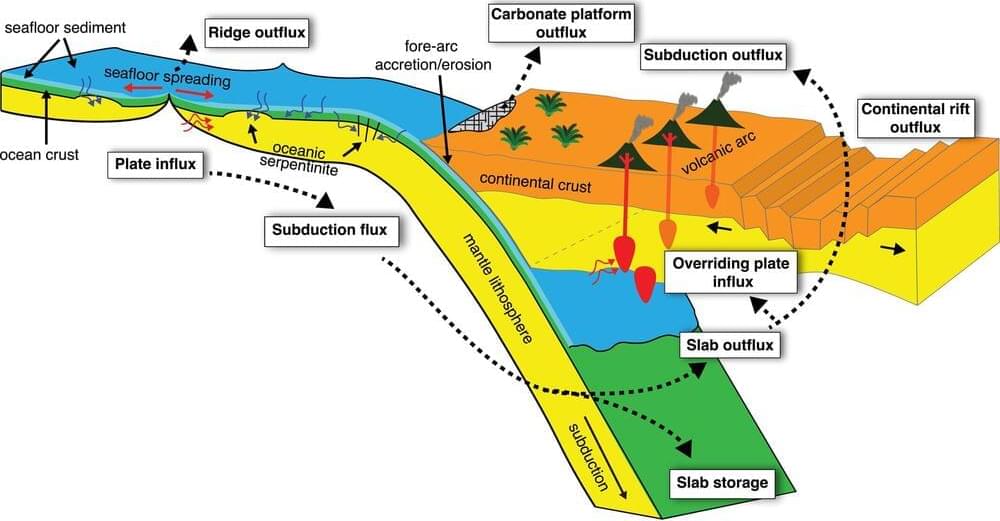
Advances in plate tectonics research provide a new view of deep Earth’s carbon emissions
From time to time, when Earth’s tectonic plates shift, the planet emits a long, slow belch of carbon dioxide. In a new modeling study published in Geochemistry, Geophysics, Geosystems, R. Dietmar Müller and colleagues show how this gas released from deep Earth may have affected the climate over the past billion years.

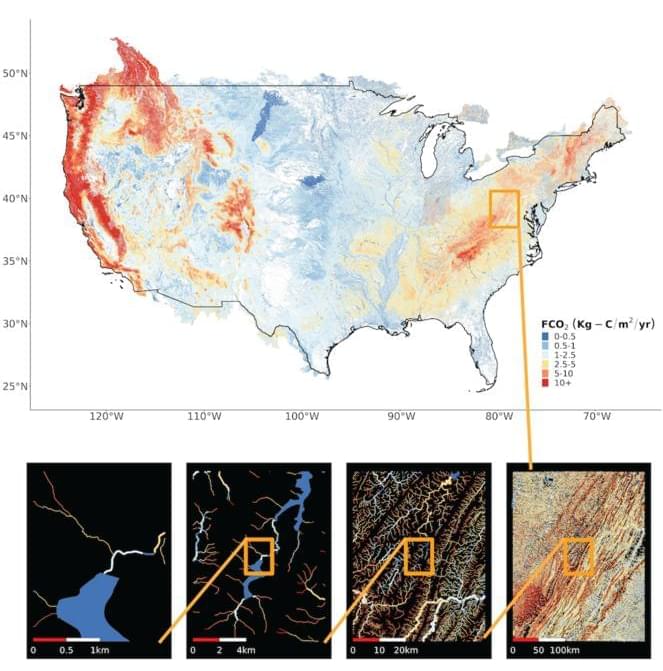
New Model Estimates CO2 Emissions from 22 Million U.S. Inland Waters
What is the level of carbon emissions across the United States? This is what a recent study published in AGU Advances hopes to address as a team of researchers from the University of Massachusetts Amherst conducted the first nationwide analysis of carbon emissions across the United States with the goal of putting constraints on previous analyses regarding the amount of carbon emissions across the United States, also known as the carbon cycle. This study holds the potential to help researchers, climate scientists, and the public better understand the United States’ contribution to climate change and the steps that can be taken to mitigate them.
“We need to know how much CO2 is being generated so we can predict how it will respond to climate change,” said Dr. Matthew Winnick, who is an assistant professor of Earth, Geographic and Climate Sciences at the University of Massachusetts Amherst and a co-author on the study. “As temperature rises, we tend to think that a lot of the natural carbon cycle processes will respond to that and potentially amplify climate change.”
For the study, the researchers collected data on carbon emissions across more than 22 million rivers, lakes, and water reservoirs with the goal of developing a model that could put tighter constraints on previous carbon cycle models. In the end, the researchers’ models estimated approximately 120 million metric tons of carbon, which is approximately 25 percent lower than previous models which estimated approximately 159 million metric tons of carbon. The researchers note these more accurate findings could benefit carbon capturing methods to mitigate climate change.

Lightning strikes kick off a game of electron pinball in space
When lightning strikes, the electrons come pouring down.
In a new study, researchers at CU Boulder led by an undergraduate student have discovered a new link between weather on Earth and weather in space. The group used satellite data to show that lightning storms on our planet can knock especially high-energy, or “extra-hot,” electrons out of the inner radiation belt—a region of space filled with charged particles that surrounds Earth like an inner tube.
The team’s results could help satellites and even astronauts avoid dangerous radiation in space. This is one kind of downpour you don’t want to get caught in, said lead author Max Feinland.
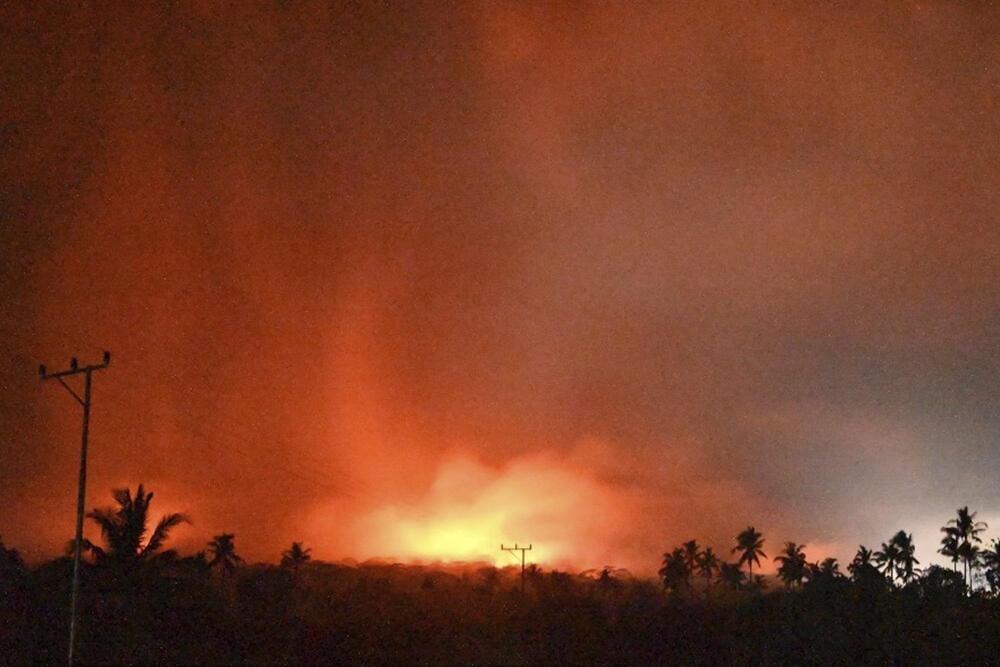
Volcano eruption claims 10 lives, forces thousands to flee
At least 10 people including a child have died in Indonesia following a series of powerful volcanic eruptions that destroyed homes and a Catholic convent, authorities said.
The eruptions, originating from Mount Lewotobi Laki Laki, hit the remote island of Flores on Monday, according the country’s National Disaster Management Agency.
They began around midnight, sending thick plumes of ash up to 6,500 feet into the atmosphere and depositing hot ash on several nearby villages.

New Method Unravels Complex Causality
Summary: A new method developed by researchers allows scientists to identify unique, redundant, and synergistic causality, providing a clearer view of what influences complex systems. Known as SURD, this method has implications across diverse fields, from climate science to aerospace engineering.
Traditional methods often confuse variables that are not true causes, but SURD accurately decomposes causality, minimizing errors. This tool has the potential to aid in the design of optimized systems by pinpointing causative factors more precisely.
The researchers demonstrated SURD’s utility by examining turbulence, revealing previously hidden interactions between airflow variables. Their work highlights the benefits of SURD for more accurate causal analysis in complex fields.
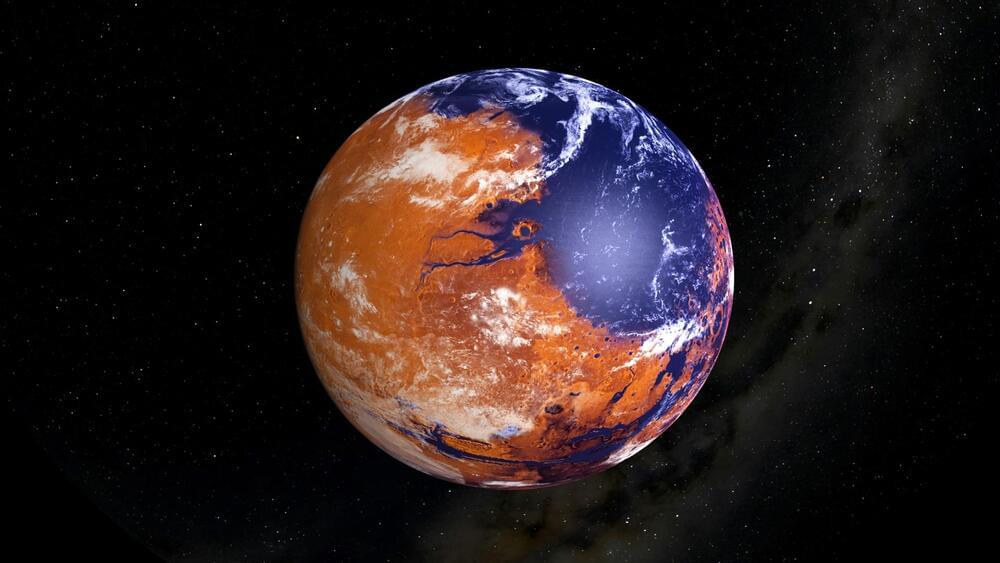
New Insights into how Mars became Uninhabitable
NASA’s Curiosity rover, currently exploring Gale crater on Mars, is providing new details about how the ancient Martian climate went from potentially suitable for life – with evidence for widespread liquid water on the surface – to a surface that is inhospitable to terrestrial life as we know it.
Although the surface of Mars is frigid and hostile to life today, NASA’s robotic explorers at Mars are searching for clues as to whether it could have supported life in the distant past. Researchers used instruments on board Curiosity to measure the isotopic composition of carbon-rich minerals (carbonates) found in Gale crater and discovered new insights into how the Red Planet’s ancient climate transformed.
“The isotope values of these carbonates point toward extreme amounts of evaporation, suggesting that these carbonates likely formed in a climate that could only support transient liquid water,” said David Burtt of NASA’s Goddard Space Flight Center in Greenbelt, Maryland, and lead author of a paper describing this research published October 7 in the Proceedings of the National Academy of Sciences. “Our samples are not consistent with an ancient environment with life (biosphere) on the surface of Mars, although this does not rule out the possibility of an underground biosphere or a surface biosphere that began and ended before these carbonates formed.”

Thunderstorms Get Wilder: New Gamma-Ray Phenomena Discovered Above the Clouds
Recent findings indicate that gamma-ray emissions from thunderstorms are far more complex and dynamic than previously understood, thanks to observations of new phenomena like Flickering Gamma-Ray Flashes (FGFs).
These flashes, alongside in-depth studies on tropical thundercloud emissions, suggest that our understanding of atmospheric electricity is evolving. This is supported by extensive fieldwork during the ALOFT campaign, which gathered unprecedented data over the Gulf of Mexico and surrounding areas.
Thunderstorm Gamma-Ray Emissions
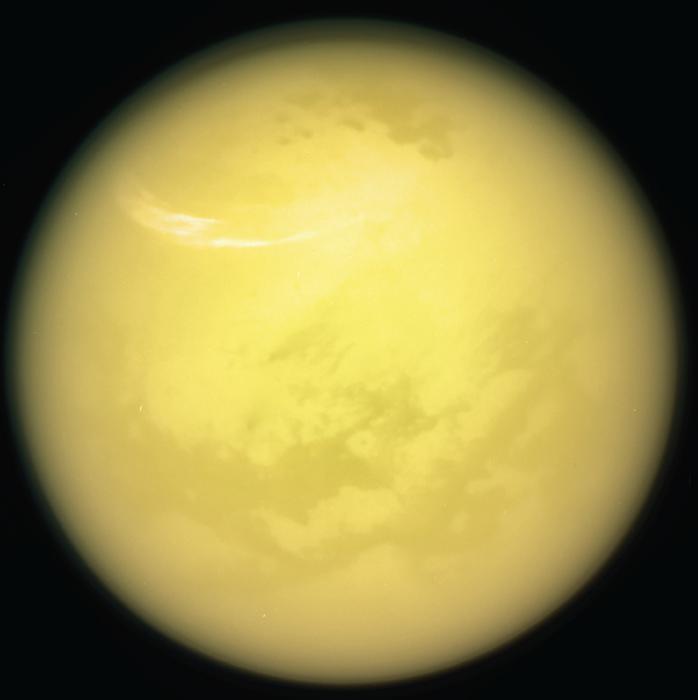
Titan’s Atmosphere and Climate: Lessons from an Alien World
Dr. Lauren Schurmeier: “The methane clathrate crust warms Titan’s interior and causes surprisingly rapid topographic relaxation, which results in crater shallowing at a rate that is close to that of fast-moving warm glaciers on Earth.”
How does Saturn’s largest moon, Titan, have such a methane-rich atmosphere? This is what a recent study published in The Planetary Science Journal hopes to address as a team of researchers investigated how methane that resides with Titan’s crust could be responsible for the lack of depth in Titan’s impact craters, which could explain why Titan’s atmosphere has so much methane, as well. This study holds the potential to help researchers better understand the formation and evolution of Titan and whether it could host life as we know it.
For the study, the researchers used computer models to simulate the formation and evolution of impact craters on Titan, of which only approximately 90 have been identified via satellite imagery from NASA’s Cassini spacecraft.
“This was very surprising because, based on other moons, we expect to see many more impact craters on the surface and craters that are much deeper than what we observe on Titan,” said Dr. Lauren Schurmeier, who is a research associate in the Hawai‘i Institute of Geophysics and Planetology (HIGP) and lead author of the study. “We realized something unique to Titan must be making them become shallower and disappear relatively quickly.”